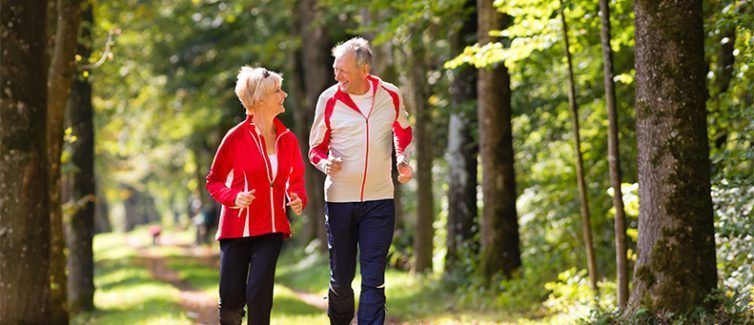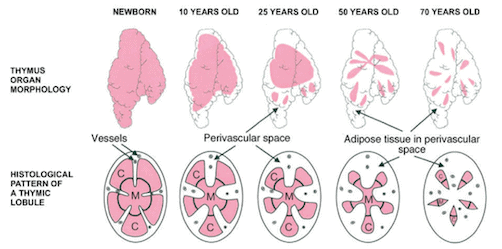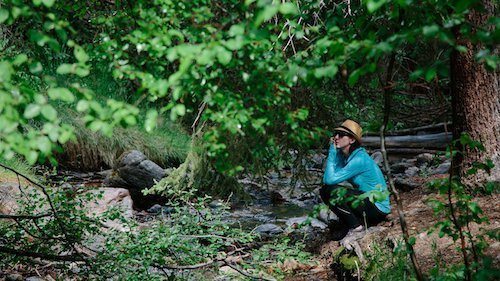Let Nature Strengthen Your Immune System

You can strengthen your immune system by the healing nature of Nature, and become more resistant to COVID-19 infection. Here are three reasons why you really need a walk (or run) in the woods.
Check out my Covid Immunity CourseI’ll get right to the point: one way not to strengthen your immune system is to stay indoors! In the era of this coronavirus pandemic, many of us have made our home our oasis. And that’s to our detriment!
We’ve become reluctant to emerge from our caves and engage the world for fear of getting infected with the SARS-CoV-2 virus. That’s a mistake. As long as you practice social distancing when outside (six feet apart), getting some exercise and communing with nature can strengthen your immune system without the risk of infection.
If and when you get exposed to SARS-CoV-2, you’ll want to have a strong immune system. And as I’ll show you, getting some exercise, getting outdoors, and being (strangely) among the trees, can strengthen your immune system.
That being in nature can strengthen your immune system is true for three reasons:
- Exercise makes us less vulnerable to viral infections, including influenza and the common cold. (The exception to this is overdoing it, which can weaken your immune system.)
- Spending a few days in a forest results in an increase in the number and activity of our natural killer cells – immune cells that help to detect and destroy viruses and cancer cells – in our blood.
- Our bodies produce vitamin D from sunlight, and vitamin D is a proven intervention against respiratory illnesses, such as COVID-19, the disease made by SARS-CoV-2.
Read on and find out how spending time in nature can strengthen your immune system in ways that may be especially helpful in dealing with SARS-CoV-2 .
Strengthen Your Immune System With Exercise
There is nearly no direct evidence that much of anything that you can do will definitely make you immune from COVID-19, because this a “novel” virus; we’ve never been exposed to it before, and therefore it has yet to be studied extensively.
Consequently, there’s no scientific data proving that regular exercise will make you less susceptible to getting COVID-19; however, various studies have suggested that exercise strengthens our defenses against viral infections including influenza and the common cold, as well as increasing the immune response to vaccination, whenever we get one for SARS-CoV-2.
One explanation for these exercise benefits is because it reduces stress, which can impair our immune system. Professor Neil Walsh, who studies the impact of exercise on the immune system at Liverpool John Moores University in the UK, said:
We know that people use exercise as a buffer for stress, and it’s very clear that high levels of chronic stress are not good for the immune system. So, if you can reduce your stress levels by being active, then that will have a positive impact on your health.
A research article, The Power of Exercise, made the same conclusion based on a study of the impact of stress on telomeres:
“Chronic psychological stress is associated with detrimental effects on physical health, and may operate in part through accelerated cell aging, as indexed by shorter telomeres at the ends of chromosomes. However, not all people under stress have distinctly short telomeres, and we examined whether exercise can serve a stress-buffering function. We predicted that chronic stress would be related to short telomere length (TL) in sedentary individuals, whereas in those who exercise, stress would not have measurable effects on telomere shortening.”
Telomeres are thought to be a measure of biological aging. You can learn more about them in this article I wrote, but suffice to say here is that, on average, the older you get, the less robust is your immune system for many reasons, including that the thymus shrinks as we age. Given that it plays an important role in the development of a normal, healthy immune system, our immune system tends to weaken as we age and the thymus shrinks.
Know that there are two types of aging — chronological and biological, and they’re often not in sync: you can be biologically older or younger than your chronological years. The robustness of your immune system largely reflects your biological age, not your calendar age.
By the way, the hypothesis of the exercise study that I quoted above was proven experimentally — regular exercise reduced the effects of stress on telomere length; meaning, those in the study who exercised aged less biologically.
To enhance immunity, my recommendation is that you alternate between cardiovascular exercise and muscle-building exercise. For cardio, walk quickly, walk up hills, jog, bicycle or swim. For muscle-building, do calisthenics or weightlifting.
Short Home Workouts You Can Do Now With Surprising Results
Why “Greasing The Groove” Will Make You Ageproof
Do You Sit All Day? Why Apple CEO Tim Cook Says “Sitting Is The New Cancer”
Strengthen Your Immune System In A Forest
If you can exercise in a park, woodland or other green space, do it! Studies show that getting outdoors in nature – even to an urban park – lowers people’s heart rates and blood pressure, as well as normalizing secretion of the stress hormone, cortisol. (Chronic cortisol degrades telomere length, by the way.) Living near nature and experiencing it directly is linked to a reduced risk of cardiovascular disease, type 2 diabetes and early death.
Strange, but trees may have a direct immune system booster. Several studies indicate that some days spent dwelling in a first increases the number and activity of our natural killer cells in our blood. (Natural killer cells are immune cells that help to detect and destroy viruses and cancer cells.) Scientists in Japan have proposed that the inhalation of substances called phytoncides, which are released by trees, may be a contributing factor. Phytoncides have been shown to alter the activity of human natural killer cells when they’re grown outside the body, although further work is needed to confirm whether inhaling them has a similar effect.
Spending time outdoors can also improve the quality of our sleep. All the time many of us have spent sequestered inside during lock-down may have disrupted our circadian rhythms, which are activated by natural light and are essential for numerous needed biological processes, like sleep.
Our circadian rhythms are usually kept synchronized, or entrained, to the time of day when we are outdoors through the action of bright light hitting a set of light-sensitive cells at the back of the eye. These eye cells communicate with a patch of brain tissue called the suprachiasmatic nucleus, which functions as the body’s master clock.
Indoor light doesn’t cause entrainment. If you don’t go outdoors regularly, your circadian rhythms may get disrupted, and your sleep as well.
What I learned by living without artificial light
The Circadian Code: Lose Weight and Supercharge Your Health
Why Intermittent Energy Restriction and Circadian Rhythms Optimize Your Health
Strengthen Your Immune System With Sunlight
A forest might not be near you, but the sun usually is, and that may be good enough. Our body makes vitamin D from exposure to UVB on our skin. This daily dose of vitamin D can help to strengthen our bones and teeth, but it also has an effect on our immune cells. (See the NIH guideline on necessary sunlight exposure and/or vitamin D supplementation.)
Vitamin D enables the macrophages in our lungs – a first line of defense against respiratory infections – to spew out an antimicrobial peptide called cathelicidin, killing bacteria and viruses directly. It also tweaks the activity of other immune cells, such as B and T cells, which coordinate longer-term responses. People with low levels of vitamin D are at greater risk of viral respiratory tract infections such as influenza.
Researchers are now investigating whether vitamin D supplements could reduce the risk of some of the severe complications associated with COVID-19. Surprisingly, European populations with the highest death rates from COVID-19, including Spain and Italy, have the lowest levels of vitamin D. Yes, those countries are bathed in sunlight, but guess what? Lifestyle changes in those populations have led people to spend more time indoors, which combined with greater use of sunscreen, may be responsible for the lower levels of vitamin D.
How To Boost Your Immune System To Fight Viruses Like Coronavirus (Covid-19)
30 Reasons to Take Vitamin D — Watch
Your Takeaway
Remember this one thing about strengthening your immune system in the era of COVID-19:
Get outdoors regularly and exercise, even if that’s just a long walk in the woods.
My other articles about the coronavirus pandemic:
- Forget Herd Immunity — Make Your Immune System Smart!
- Choose A Reusable Antiviral Face Mask To Protect Yourself and Others
- Your Aging Immune System and COVID-19
- How To Test Yourself for Coronavirus at Home
- Are COVID-19 and Obesity Linked?
- Why Influenza and COVID-19 Pandemics Will Not Disappear
- Be Productive At Home During The COVID-19 Scare
- How To Boost Your Immune System To Fight Viruses Like Coronavirus (Covid-19)
Last Updated on February 7, 2024 by Joe Garma






